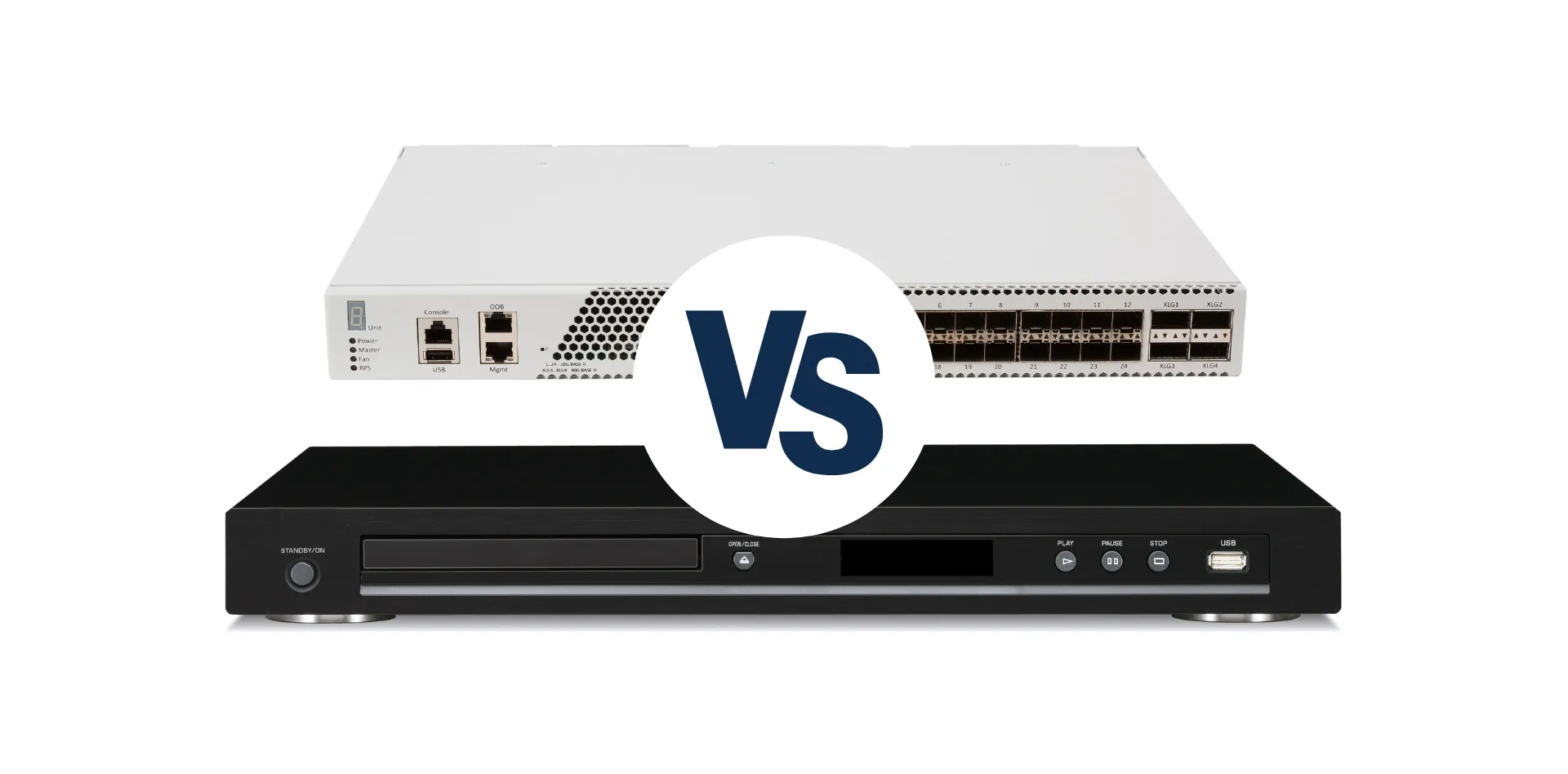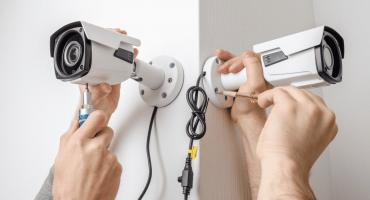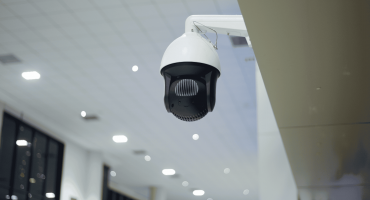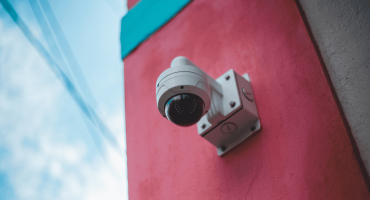In This article
Shopping for a video surveillance system can seem daunting, especially when so many options out there sound technical — some people find themselves questioning a DVR (digital video recorder) vs. NVR (network video recorder) video setup and immediately want to shut down.
Luckily, a DVR vs. NVR set up isn’t as technical as it sounds.
In this article, we’ll break it all down for you, including:
- What a DVR and NVR are
- The key differences between these two video set ups
- How to evaluate which of these set ups, if either of them, is right for surveillance for your business
Let’s dive in.
TL;DR? Check out this summary on DVR vs. NVR

What is a DVR?
A DVR, or digital video recorder, is an electronic device that records, stores, and plays back video footage. It is commonly employed in surveillance and security systems to capture and retain camera video data. DVRs can be analog or digital and are designed to work with different types of cameras, including closed-circuit television (CCTV) cameras.
The DVR encodes video signals into a digital format for storage, manages the storage of recorded video, and provides the ability to retrieve and view footage later. DVRs are equipped with various features such as motion detection, scheduled recording, and remote access, allowing users to monitor and manage their video recordings efficiently.
What are the pros and cons of a DVR system?
Like anything in life, there are both pros and cons to a DVR system.
Pros:
- Cost-Effective: A DVR system is a more cost-effective option than NVR systems
- Compatible with older technology: If you want security without investing in new cameras, a DVR system may be the way to go. DVRs are designed to work seamlessly with analog cameras, which you may have if there are existing cameras in place.
- Ease of use: DVR systems are typically straightforward to set up and manage, making them suitable for users who prioritize simplicity in their surveillance solutions.
- Stability: Since a DVR runs on your local network, there is more stability and less of a risk of downtime
Cons:
- Less scalability/flexibility: It is hard to scale a DVR video system rapidly due to the systems needing more intricate wiring
- Lower video resolution: You won’t get the video quality you’re looking for if you want an HD option. DVRs typically have lower resolution than an IP camera.
- Fewer advanced features: DVRs are older school technology, meaning there are less options for analytic integrations or integrations with other modern technologies
What is an NVR?
Just like a DVR, a network video recorder (NVR) is a specialized device employed in video surveillance systems to capture, store, and manage digital video footage from IP cameras.
However, unlike traditional DVRs designed for analog cameras, NVRs are tailored for the digital era. They work seamlessly with IP cameras that transmit video data over a network. The core functionality of an NVR revolves around its ability to receive, process, and store high-quality digital video streams, enabling users to monitor and review surveillance footage with ease.
What are the pros and cons of an NVR system?
Just like a DVR, an NVR isn’t the perfect solution in every situation. Here are the pros and cons of an NVR system.
Pros:
- High-Resolution Support––NVR systems are optimized for IP cameras, which often provide higher resolution images compared to analog cameras, leading to improved video quality.
- Flexible Connectivity––NVRs connect to cameras through Ethernet cables or wireless networks, offering more flexibility in camera placement and reducing the need for extensive cabling.
- Scalability––NVR systems are highly scalable, allowing users to easily add or remove IP cameras as needed without major infrastructure changes, making them suitable for growing installations.
- Advanced Features––NVRs typically support advanced features such as remote viewing over the internet, intelligent video analytics, and integration with other network devices for enhanced functionality.
- Centralized Management–– NVRs provide centralized management of video data, making it easier to control and monitor the entire surveillance system from a single interface.
Cons:
- Cost––NVR systems can be more expensive than DVR systems, particularly when considering the higher cost of IP cameras and the additional networking equipment required.
- Dependency on Network Stability––The performance of NVR systems is heavily reliant on network stability. Any issues with the network can impact video streaming and system responsiveness.
- Potential Bandwidth Issues––High-resolution video streams from multiple IP cameras can consume significant bandwidth, potentially causing congestion and affecting other network activities.
- Complex Setup––Setting up an NVR system may be more complex than a DVR system, especially for users who are not familiar with networking concepts.
- Compatibility Concerns––While NVRs are designed for IP cameras; compatibility issues may arise when integrating with cameras from different manufacturers or with varying specifications.
What is the difference between a DVR and an NVR?
The biggest difference between a DVR system and an NVR system is how they communicate and transmit video data — essentially, how the video system talks with the rest of the system.
But there are some larger differences that are important to review as well.
DVRs are typically a part of an analog surveillance system, which is the more “traditional” surveillance system people think of. DVRs receive the video from their analog cameras, which then is stored. DVRs can handle both. It’s important to note that a DVR-based surveillance system has some restraints due to its more traditional set up — larger installations will be less flexible since it involves additional wiring and larger scale changes.
On the other hand, NVRs are designed to work seamlessly with IP cameras, which transmit digital video signals over a network. NVRs are connected to cameras through Ethernet cables or wireless connections. Also, unlike DVRs, NVRs rely on cameras for video processing, focusing on the storage and retrieval of digital content.
Because NVRs leverage IP cameras, installation and scaling can be more flexible for many — you aren’t having to add wiring. With NVRs, you can also benefit from other features that go beyond surveillance, like remote viewing, intelligent video analytics, or other integrations over your network.
DVR vs NVR. Doing what’s right for your business
So, what’s the best surveillance system for your business? A DVR or an NVR surveillance system?
Unfortunately, it’s not as easy as picking A or B. As outlined, both options have pros and cons — upfront cost, scalability, and more. It boils down to what makes the most sense for your exact business needs.
But you don’t need to make that decision alone. Reach out to DTiQ today to discuss your business video surveillance needs. Our team of experts will help make the decision easier, with 45,000+ locations succeeding using DTiQ today.






























